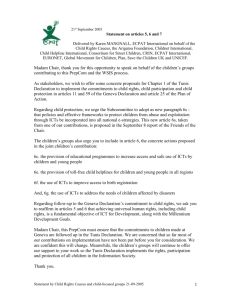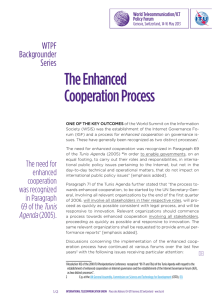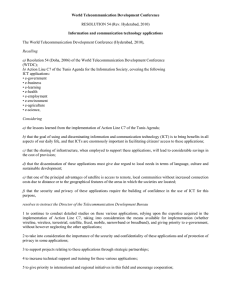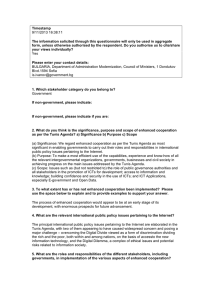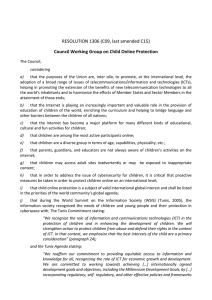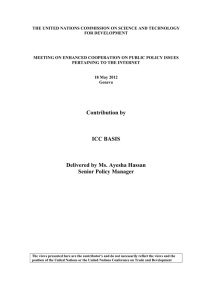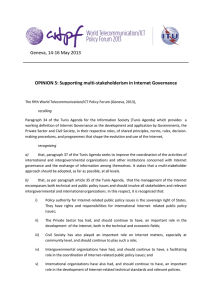WTDC-06 RESOLUTION 45 (Doha, 2006) Mechanisms for enhancing cooperation on cybersecurity,
advertisement
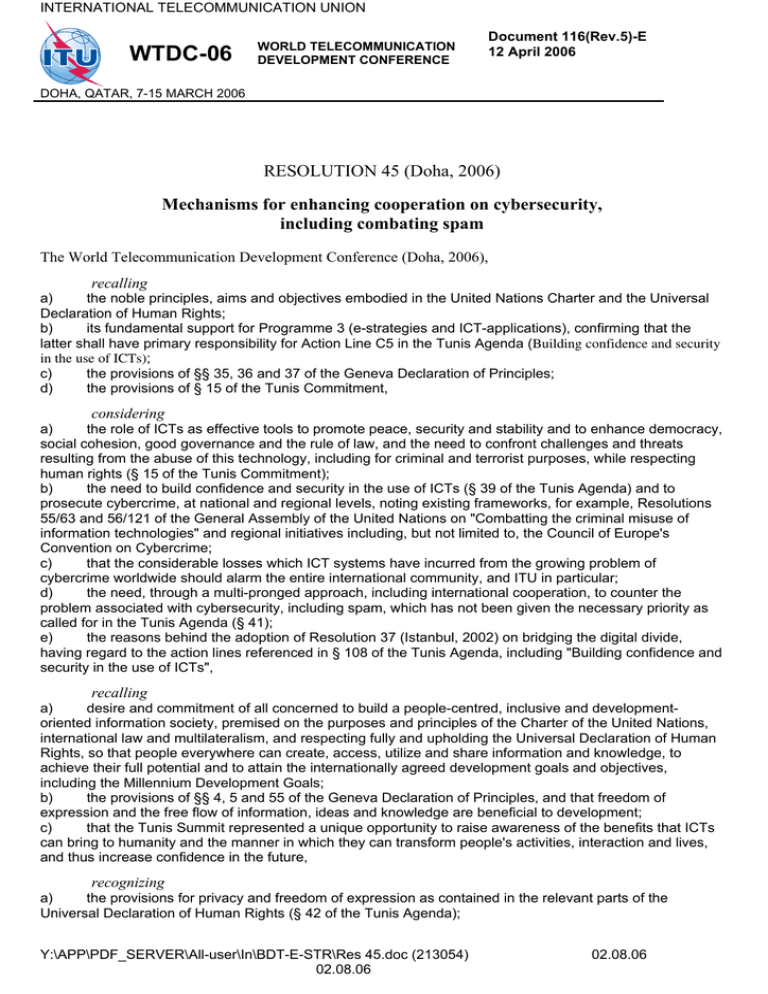
INTERNATIONAL TELECOMMUNICATION UNION WTDC-06 WORLD TELECOMMUNICATION DEVELOPMENT CONFERENCE Document 116(Rev.5)-E 12 April 2006 DOHA, QATAR, 7-15 MARCH 2006 RESOLUTION 45 (Doha, 2006) Mechanisms for enhancing cooperation on cybersecurity, including combating spam The World Telecommunication Development Conference (Doha, 2006), recalling a) the noble principles, aims and objectives embodied in the United Nations Charter and the Universal Declaration of Human Rights; b) its fundamental support for Programme 3 (e-strategies and ICT-applications), confirming that the latter shall have primary responsibility for Action Line C5 in the Tunis Agenda (Building confidence and security in the use of ICTs); c) the provisions of §§ 35, 36 and 37 of the Geneva Declaration of Principles; d) the provisions of § 15 of the Tunis Commitment, considering a) the role of ICTs as effective tools to promote peace, security and stability and to enhance democracy, social cohesion, good governance and the rule of law, and the need to confront challenges and threats resulting from the abuse of this technology, including for criminal and terrorist purposes, while respecting human rights (§ 15 of the Tunis Commitment); b) the need to build confidence and security in the use of ICTs (§ 39 of the Tunis Agenda) and to prosecute cybercrime, at national and regional levels, noting existing frameworks, for example, Resolutions 55/63 and 56/121 of the General Assembly of the United Nations on "Combatting the criminal misuse of information technologies" and regional initiatives including, but not limited to, the Council of Europe's Convention on Cybercrime; c) that the considerable losses which ICT systems have incurred from the growing problem of cybercrime worldwide should alarm the entire international community, and ITU in particular; d) the need, through a multi-pronged approach, including international cooperation, to counter the problem associated with cybersecurity, including spam, which has not been given the necessary priority as called for in the Tunis Agenda (§ 41); e) the reasons behind the adoption of Resolution 37 (Istanbul, 2002) on bridging the digital divide, having regard to the action lines referenced in § 108 of the Tunis Agenda, including "Building confidence and security in the use of ICTs", recalling a) desire and commitment of all concerned to build a people-centred, inclusive and developmentoriented information society, premised on the purposes and principles of the Charter of the United Nations, international law and multilateralism, and respecting fully and upholding the Universal Declaration of Human Rights, so that people everywhere can create, access, utilize and share information and knowledge, to achieve their full potential and to attain the internationally agreed development goals and objectives, including the Millennium Development Goals; b) the provisions of §§ 4, 5 and 55 of the Geneva Declaration of Principles, and that freedom of expression and the free flow of information, ideas and knowledge are beneficial to development; c) that the Tunis Summit represented a unique opportunity to raise awareness of the benefits that ICTs can bring to humanity and the manner in which they can transform people's activities, interaction and lives, and thus increase confidence in the future, recognizing a) the provisions for privacy and freedom of expression as contained in the relevant parts of the Universal Declaration of Human Rights (§ 42 of the Tunis Agenda); Y:\APP\PDF_SERVER\All-user\In\BDT-E-STR\Res 45.doc (213054) 02.08.06 02.08.06 -2WTDC06/116(Rev.5)-E b) the need to safeguard the ethical dimensions of the information society in accordance with the Geneva Declaration of Principles and Action Plan (§ 43 of the Tunis Agenda), the need to counter terrorism (§ 44 of the Tunis Agenda) and the importance of continuity and stability of the internet (§ 45 of the Tunis Agenda), while ensuring respect for privacy and the protection of personal information and data (§ 46 of the Tunis Agenda); c) the need to effectively confront challenges and threats resulting from use of ICTs for purposes that are inconsistent with objectives of maintaining international stability and security and may adversely affect the integrity of the infrastructure within States to the detriment of their security, and that it is necessary to work to prevent the abuse of information resources and technologies for criminal and terrorist purposes, while respecting human rights; d) the role of ICTs in the protection of children and in enhancing their development and that action to protect children from abuse and defend their rights in the context of ICTs should be strengthened, emphasizing that the best interests of the child are a key consideration, noting a) that Resolution 50 (Florianópolis, 2004) of the World Telecommunication Standardization Assembly on cybersecurity is confined solely to the study of technical aspects for reducing the impact of this phenomenon; b) that spam is a significant and growing problem for users, networks and the internet as a whole, and spam and cybersecurity should be dealt with at appropriate national and international levels, urges Member States to provide the support necessary for implementation of this resolution, resolves to instruct the Director of the Telecommunication Development Bureau 1 to organize, in conjunction with Programme 3 and based on member contributions, meetings of Member States and Sector Members to discuss ways to enhance cybersecurity including, inter alia, a memorandum of understanding to enhance cybersecurity and combat spam amongst interested Member States; 2 to report the results of these meetings to the 2006 plenipotentiary conference. Y:\APP\PDF_SERVER\All-user\In\BDT-E-STR\Res 45.doc (213054) 02.08.06 02.08.06
